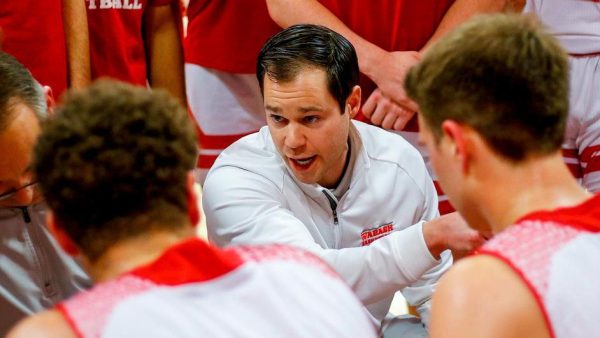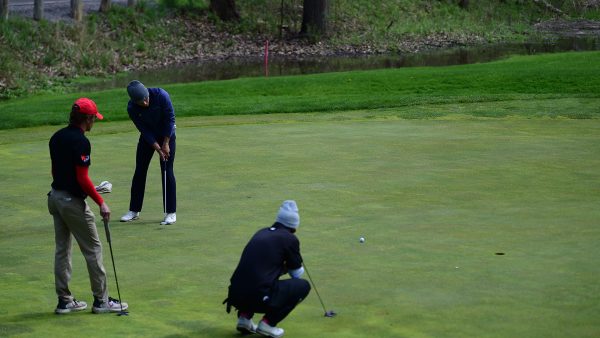Men’s rugby club tackles competition, welcomes newcomers
They come for a sport but stay for a team.
The members of the Allegheny men’s rugby team have a diverse set of athletic backgrounds, but they say the team environment is the key to success.
“Something that I really like about the rugby team is it’s a big unit,” said club President Noah Tart, ’22. “We all work together in everything that we do — not just on the field, but off the field, with everything like academics. I think we’re all a really close group of guys regardless of our backgrounds and whatever else we do on campus.”
Tart’s own background is based in wrestling, a sport he says he did “a lot” of in high school. Moving away from that experience made him miss having a sport to focus on, he said, and so he decided to try rugby after seeing a post on his class Facebook page.
“I fell in love with it almost immediately,” Tart said. “I ended up spending the majority of my first year playing rugby.”
Fellow first-year club member Brandon Bolling also came to rugby from a different high school contact sport. After playing high school football, he said his conversations with existing club members piqued his interest enough to come to practice and try a new sport.
Bolling said incoming club members usually fall into one of two categories: having had extensive experience with rugby or having had very little.
“It’s really either or,” Bolling said. “I knew, like, nothing at all.”
Bolling and Tart both emphasized the club’s willingness to teach the fundamentals to those who fall into the category of knowing “nothing at all.”
“They were like, ‘seems dumb, but here’s how you throw a ball,’ and they work through the fundamentals, and they’re really good with new people,” Tart said. “We usually have one new person come a week.”
Tahmoor Akram, ’19, came to rugby with more experience than Bolling and Tart. Originally from England, Akram has been playing rugby since middle school. He said he enjoys the game more in the American context, where the sport is less widely known.
“It makes it easier to take (rugby) less seriously,” Akram said. He added that the sport has been played more physically and with less emphasis on technique in his time at Allegheny compared to the rugby he played in England.
Akram’s experience with the sport helped him to become one of the team captains — a position that puts him on the front lines of welcoming and integrating new club members.
“We usually have one new person come a week,” Tart said. “Regardless of the experience, they’re always welcoming new people. Everyone starts somewhere.”
Akram stressed the role of the captains in the team’s success, particularly in light of the fact that the team is lacking one element other teams have brought to divisional competition.
“We were the only team without a coach,” Akram said.
Despite the lack of external coaching, the team’s high morale helped it to secure a championship win, Tart said. The team went undefeated within their division in the fall.
Akram said while the team works hard to achieve its success, the club sport has a generally laid-back environment.
“It’s relatively low commitment,” Akram said.
The team practices on Mondays and Wednesdays, with times and locations dependent on the weather. Whenever possible, the team practices at Robertson Athletic Complex from 5 to 6:30 p.m. When outdoor practice is impractical — Tart cited “Meadville snow” as a frequent obstacle in outdoor play — the team practices from 10 to 11:15 p.m., when the David V. Wise Center blue courts are available.
The weather is also a significant factor in dictating competition schedules, Tart said. The team competes most frequently in the fall, when they travel nearly every weekend. Winter is the slowest season, since events are only hosted by teams who have access to indoor facilities.
Now that the spring season is picking up, Tart said the team is competing “roughly two or three times a month.” Akram explained that scheduling these games amidst frequent cancellations is one of the biggest obstacles the team faces.
The spring season involves less frequent competition, but often more games, according to Akram. Games played in the spring, called “sevens,” are usually shorter with seven-minute halves as opposed to “fifteens,” which have 40-minute halves.
The game is played with 15 people on the field at a time. Akram said Allegheny usually brings anywhere from 21 to 26 people to weekend competitions.
While the team has enjoyed its victories in many of these games, Tart said he and his teammates focus on effort over score.
“Even if we don’t perform that great, if you give it your all, I consider that a good performance,” Tart said. “Even if we lose a lot to a little, but we put all of our heart into it, I feel like that goes a longer way than a winning record with no heart.”
Olivia Blakeslee is a senior majoring in English with a minor in journalism in the public interest. This is her fourth year on staff, and she is serving...







